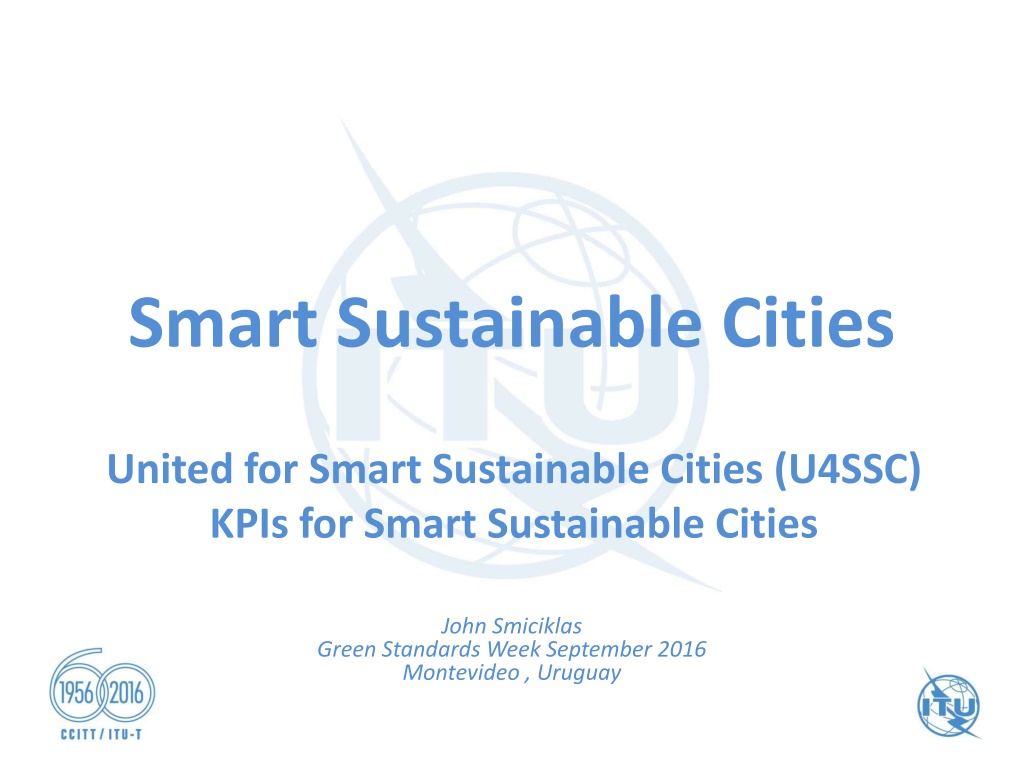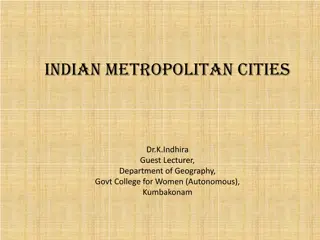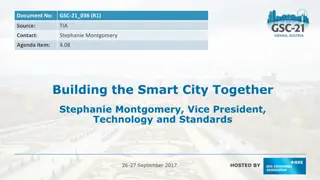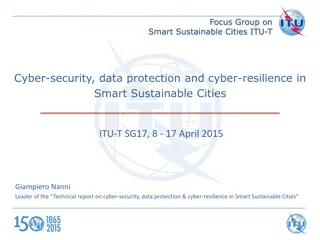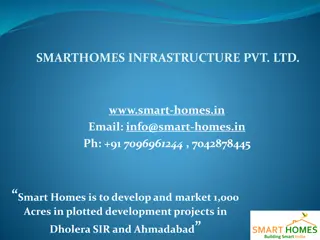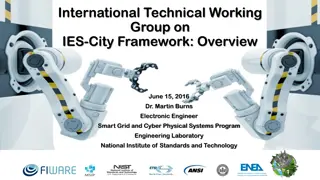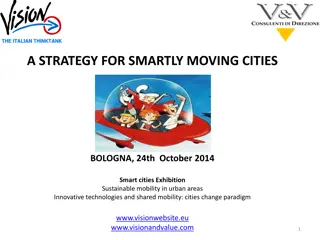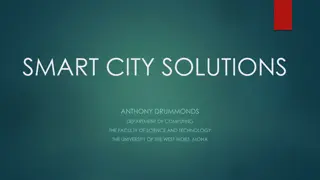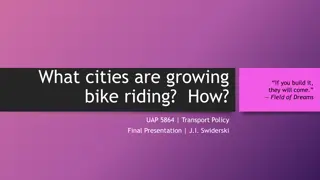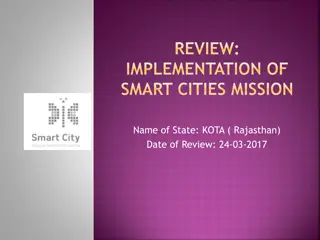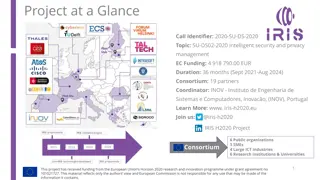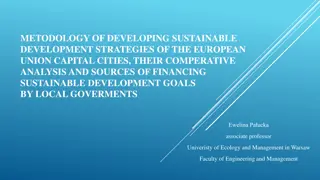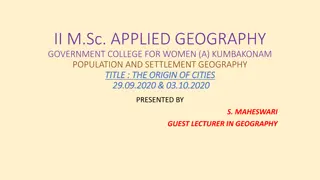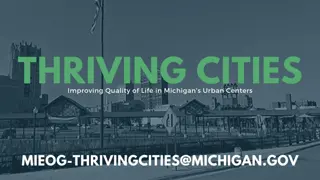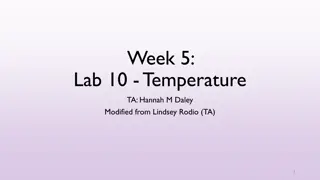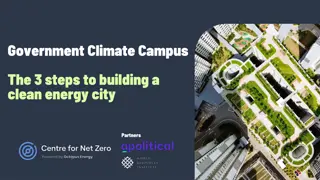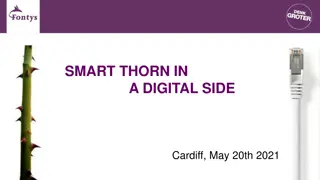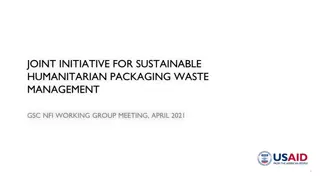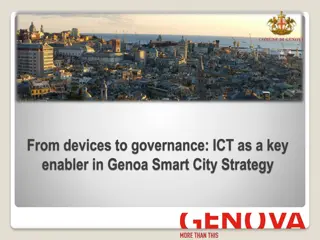United for Smart Sustainable Cities (U4SSC) Initiative Overview
The United for Smart Sustainable Cities (U4SSC) initiative, launched by ITU and UNECE, advocates for using ICT to transition to smart sustainable cities. Co-chaired by prominent figures, U4SSC focuses on smart living, mobility, environment, governance, people, and economy through working groups and KPIs. The goal is to create innovative cities that enhance quality of life, urban efficiency, and competitiveness while meeting the needs of current and future generations across economic, social, environmental, and cultural aspects.
Download Presentation

Please find below an Image/Link to download the presentation.
The content on the website is provided AS IS for your information and personal use only. It may not be sold, licensed, or shared on other websites without obtaining consent from the author. Download presentation by click this link. If you encounter any issues during the download, it is possible that the publisher has removed the file from their server.
E N D
Presentation Transcript
Smart Sustainable Cities United for Smart Sustainable Cities (U4SSC) KPIs for Smart Sustainable Cities John Smiciklas Green Standards Week September 2016 Montevideo , Uruguay
United for Smart Sustainable Cities (U4SSC) ITU and UNECE launched "United for Smart Sustainable Cities" (U4SSC) in response to the Sustainable Development Goal 11: "Make cities and human settlements inclusive, safe, resilient and sustainable". U4SSC will primarily advocate for public policy to encourage the use of ICTs to facilitate and ease the transition to smart sustainable cities http://www.itu.int/en/ITU-T/ssc/united/Pages/default.aspx Includes all other UN agencies ( E.g. WHO, UNIDO, ILO, FAO, etc.) First Meeting held 21-22 July, 2016 Geneva
United for Smart Sustainable Cities (U4SSC) Co-Chaired by H.E Daiva Matoniene, Vice-Minister of the Ministry of Environment of Lithuania, Mr. Nasser Al Marzouqi, Chairman of ITU-T Study Group 20 (IoT and Smart Cities). Dr. Paolo Gemma (Huawei) serves as the Vice-Chairman. The U4SSC currently has three Working Groups. These Working Groups are led by the following Co-Chairmen: Working Group 1: Ms. Llu sa Marsal (Future Cities Catapult) and Mr. Tom s Llorente (Spain) Working Group 2: Mr. John Smiciklas (BOMA) and Mr. Hazam Galal (PwC) Working Group 3: Ms. Kari Eik (OiR) and Mr. Okan Geray (Smart Dubai)
United for Smart Sustainable Cities (U4SSC) A smart sustainable city is an innovative city that uses ICTs and other means to improve the quality of life, efficiency of urban operations and services, and competitiveness, while ensuring that it meets the needs of present and future generations with respect to economic, social, environmental, as well as cultural aspects.
United for Smart Sustainable Cities (U4SSC) WG 2Connecting Cities and Communities WG3 Enhancing Innovation and Participation WG1 Setting the Framework Urban Planning Policy, Standards and Regulation Key Performance Indicators Smart Living Smart Mobility Smart Environment Smart Governance Smart People Smart Economy
ITU UNECE Smart Sustainable Cities KPIs
ITU UNECE Smart Sustainable Cities KPIs The evaluation of SSC using ITU-UNECE KPIs aims to improve the urban functionalities, improve quality of life, and ensure environmental, economic and social sustainability. ITU and UNECE believes that SSC projects will thrive based on their ability to identify, define, monitor their actions. As the goals for moving towards increased smartness and sustainability differ between cities, based on their economic power or/and population growth etc, cities are encouraged to use an internationally standardized KPIs before they embark on their SSC journey.
ITU UNECE Smart Sustainable Cities KPIs Why KPIs are needed Shows what data to collect Standardizes data collection Shows gaps in policy Shows areas for improvement Pathway to SSC
ITU UNECE Smart Sustainable Cities KPIs Pilot cities Dubai Singapore Manizales Montevideo Buenos Aires Valencia Rimini
ITU UNECE Smart Sustainable Cities KPIs 3 Working Groups Economy Group Leader: Mr. John Smiciklas (BOMA) Environment Group Leader: Ms. Gundula Prokop (Environment Agency Austria) Society and Culture Group Leader: Mr. Pawel Stano (JRC-European Commission)
ECONOMY ICT Productivity Infrastructure ADVANCED ICT Drainage system monitoring ICT Noise monitoring Labour productivity Sporting facilities SMEs Water Supply loss Electricity supply system management using ICT Water Supply ICT Monitoring Pedestrian infrastructure Creative industry employment Tourism industry employment Urban development and spatial planning Clean energy transportation Clean energy transportation Clean energy transportation Traffic monitoring e- Public Services adoption Open data
ECONOMY ICT Productivity Infrastructure CORE Wireless broadband subscriptions Electricity system outage frequency Household with a computer Internet Access R&D expenditure Patents Availability of smart water meters Public transport network Electricity system outrage time Fixed broadband subscriptions Employment rate Availability of Smart electricity meters Real-time public transport information Road traffic efficiency Public building sustainability Wastewater collection Household sanitation Solid waste collection Access to Electricity
ENVIRONMENT Environment Energy CORE Infrastructure Proportion of city population with potable water supply Access to improved water source Renewable energy consumption Electricity consumption per capita GHG emissions (*) Air pollution Water Quality of drinking water Consumption Wastewater treated Exposure to noise Adoption of a consistent planning approval process with respect to EMF Compliance with WHO endorsed exposure guidelines Recycling of solid waste Solid waste treatment Green areas and public spaces
ENVIRONMENT Environment Energy Infrastructure ADVANCED Public buildings energy consumption Native species monitoring Protected natural area Air pollution monitoring system Drainage system management
SOCIETY AND CULTURE Education, health and culture Safety, housing and social inclusion CORE Information security and privacy protection Students ICT access School enrollment Housing expenditure Informal settlements Adult literacy Higher education ratio Electronic health records Gender income equity Life expectancy Gini coefficient Poverty Maternal mortality Doctors
SOCIETY AND CULTURE Education, health and culture Safety, housing and social inclusion ADVANCED Emergency Service Response Time Cultural infrastructure Cultural resources online In-patient hospital beds Natural disaster- related deaths Resilience plans Food security monitoring and surveillance Protected cultural heritage sites Disaster-related economic losses Disaster and emergency alert Health insurance Police presence Child Online Protection (COP) Food aid
